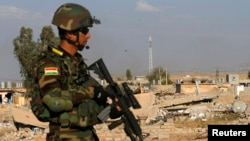The United States has expanded its airstrikes against Islamic State (IS) militant group targets, hitting an IS fighting position near Baghdad firing on Iraqi security forces. U.S. lawmakers Tuesday begin debating providing military assistance to rebels opposed to both IS militants and Syria’s government.
Less than a week after President Barack Obama pledged a multi-step campaign to degrade and destroy IS militants, U.S. attack and fighter aircraft were used Sunday and Monday beyond humanitarian missions and protecting U.S. personnel. Two airstrikes targeted IS positions in Sinjar to the north and southwest of Baghdad in support of Iraqi offensive operations. The number of air strikes has grown to 162 since early August.
RAND Corporation senior political scientist Rick Brennan, a career U.S. Army officer, said it is difficult to conduct close air support operations absent U.S. forces embedded with Iraqi units.
"There is currently no plan to provide the type of close air support that would be necessary without having U.S. special operations forces, or other people, engaged in providing the air-to-ground integration effort. Now, some of those can be done, as it was done on the dam near Mosul if you see large columns, or pieces of equipment, that are clearly in the possession of ISIS. Those are easily observed from the air and can be attacked. Absent those easy targets, it would be very difficult to integrate air and ground [forces] without having U.S. boots on the ground embedded in combat forces of the coalition," said Brennan.
About 30 countries have pledged to join the United States in fighting against IS militants who have taken over parts of Iraq and Syria, carried out atrocities against religious minorities, and beheaded three Western hostages. The United States is working to build an international coalition that would include airstrikes, ground forces, and cutting off funding for the militants.
Obama, who will be briefed Wednesday by defense officials at U.S. Central Command in Tampa, Florida, has also authorized potential airstrikes against IS targets in Syria. But he has ruled out working with Syrian President Bashar al-Assad against the IS group, which is fighting to topple him. Washington regards Assad as an illegitimate leader and a criminal.
Monday, White House spokesman Josh Earnest was asked if the president is prepared to take out Syrian defenses should U.S. aircraft be ordered to attack IS targets inside Syria.
"There are rules of engagement any time that our men and women in uniform are put into harm’s way, and so there will be rules of engagement that are related to any military orders that the president directs, military actions that the president directs. But, it won’t surprise you to know that there are contingencies related to self-defense when it comes to these sorts of rules of engagement," responded Earnest.
Senior U.S. officials said Monday Syrian air defenses would face retaliation if Damascus attempted to respond to U.S. airstrikes against IS targets. Brennan said he has no doubt such airstrikes will be launched inside Syria:
"The air packages that would be going into Syria will not only have the ability to target forces on the ground, but also be able to have platforms that could sense and respond to any kind of anti-air capabilities, so that part is clear. The harder part, I think, is going to be when the president tries to stand up capabilities with the Free Syrian Army, an army that, at this point, is virtually non-existent. This will take most likely years to develop into a capable force that’s not only capable of confronting ISIS and, potentially, the al-Nusra Front, but it will have to be able to deal with other organizations, such as the Iranian-backed militia and the Lebanese Hezbollah, which oppose them, and the Assad regime," said Brennan.
In Washington Tuesday, the U.S. House of Representatives begins debate on legislation to give congressional approval for arming and training rebels opposed to both IS and the Syrian government. The move was welcomed by White House spokesman Earnest.
"We’ve seen public statements from Democrats and Republicans in senior positions both in the House and the Senate indicate they support giving the administration the necessary authority to ramp up our assistance to the Syrian opposition by training and equipping them. So, we’re gratified by that show of bipartisan public support for this urgent priority," said Earnest.
He said the goal is to ensure that there is a fighting force on the ground in Syria that can take the fight to IS militants given that the president has ruled out the use of American combat troops for that purpose.
Brennan said differentiating friend from foe in Syria and providing training and arms to the right groups could be a difficult process, as it has been in Afghanistan.




